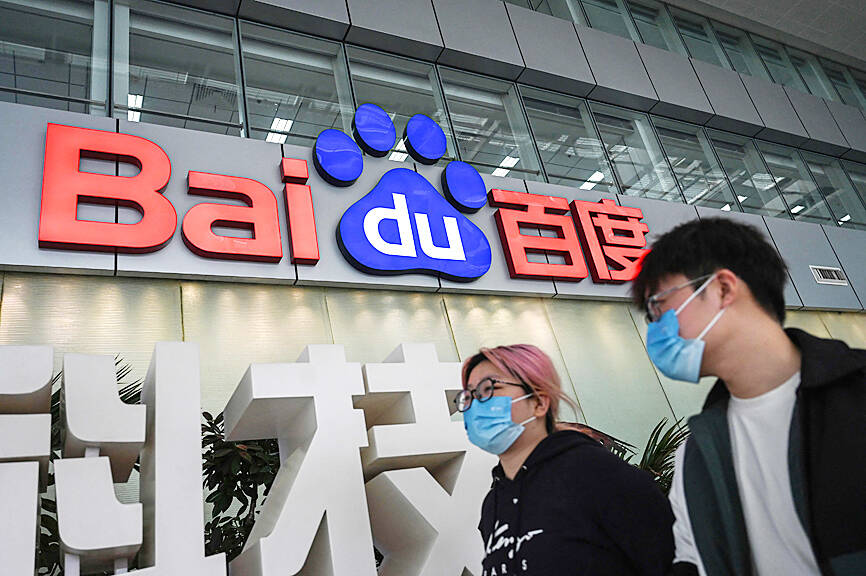Chinese Internet search giant Baidu Inc (百度) yesterday released a new artificial intelligence (AI) reasoning model and made its AI chatbot services free to consumers as ferocious competition grips the sector.
Technology companies in China have been scrambling to release improved AI platforms since start-up DeepSeek (深度求索) shocked its rivals with its open source and highly cost-efficient model in January.
In a post on WeChat, Baidu announced the launch of its latest X1 reasoning model — which the company claims performs similarly to DeepSeek’s but for lower cost — and a new foundation model, Ernie 4.5.

Photo: AFP
Baidu also made its AI chatbot Ernie Bot free for individual users more than two weeks ahead of schedule. Previously, users had to pay a subscription to access the company’s latest AI models via Ernie Bot.
Ernie 4.5 “outperforms” US-based OpenAI’s GPT-4.5 model in “multiple benchmarks,” while Ernie X1 features “enhanced capabilities in understanding, planning, reflection and evolution,” Baidu said.
The Beijing-based company was one of China’s first to roll out a generative AI platform publicly, in 2023, but rival chatbots from companies such as TikTok owner ByteDance Ltd (字節跳動) and Moonshot AI Technology Co (月之暗面) have since gained more users.
Baidu faces stiff competition in the consumer-facing AI sector where DeepSeek shook up the industry at home and abroad with a model that performed comparably to competitors such as US-made ChatGPT, but cost much less to develop.
Last month, WeChat owner Tencent Holdings Ltd (騰訊) released a new AI model that it claimed answers queries faster than DeepSeek, even as it incorporated its rival’s technology into its messaging platform.
The same month, Alibaba Group Holding Ltd (阿里巴巴), which has partnered with Apple Inc to develop AI for the US company’s phones in China, said it would invest 380 billion yuan (US$52.5 billion) in AI and cloud computing over the next three years.
Alibaba this month also released a new version of its AI assistant app powered by its open-source Qwen reasoning model.

TARIFFS: The global ‘panic atmosphere remains strong,’ and foreign investors have continued to sell their holdings since the start of the year, the Ministry of Finance said The government yesterday authorized the activation of its NT$500 billion (US$15.15 billion) National Stabilization Fund (NSF) to prop up the local stock market after two days of sharp falls in reaction to US President Donald Trump’s new import tariffs. The Ministry of Finance said in a statement after the market close that the steering committee of the fund had been given the go-ahead to intervene in the market to bolster Taiwanese shares in a time of crisis. The fund has been authorized to use its assets “to carry out market stabilization tasks as appropriate to maintain the stability of Taiwan’s

STEEP DECLINE: Yesterday’s drop was the third-steepest in its history, the steepest being Monday’s drop in the wake of the tariff announcement on Wednesday last week Taiwanese stocks continued their heavy sell-off yesterday, as concerns over US tariffs and unwinding of leveraged bets weighed on the market. The benchmark TAIEX plunged 1,068.19 points, or 5.79 percent, to 17,391.76, notching the biggest drop among Asian peers as it hit a 15-month low. The decline came even after the government on late Tuesday authorized the NT$500 billion (US$15.2 billion) National Stabilization Fund (國安基金) to step in to buoy the market amid investors’ worries over tariffs imposed by US President Donald Trump. Yesterday’s decline was the third-steepest in its history, trailing only the declines of 2,065.87 points on Monday and

TARIFF CONCERNS: The chipmaker cited global uncertainty from US tariffs and a weakening economic outlook, but said its Singapore expansion remains on track Vanguard International Semiconductor Corp (世界先進), a foundry service provider specializing in producing power management and display driver chips, yesterday withdrew its full-year revenue projection of moderate growth for this year, as escalating US tariff tensions raised uncertainty and concern about a potential economic recession. The Hsinchu-based chipmaker in February said revenues this year would grow mildly from last year based on improving supply chain inventory levels and market demand. At the time, it also anticipated gradual quarter revenue growth. However, the US’ sweeping tariff policy has upended the industry’s supply chains and weakened economic prospects for the world economy, it said. “Now

An employment discrimination lawsuit against contract chipmaker Taiwan Semiconductor Manufacturing Co (TSMC, 台積電) might soon be expanded after a hearing in a federal court in San Jose, California, on Tuesday to add 15 plaintiffs to the case. According to a court document, the lawsuit, which was refiled in November last year as a form of a class action with 13 plaintiffs in California, wants to add 15 plaintiffs from Arizona, where TSMC is building up its wafer fab capacity. TSMC first committed between 2020 and last year to invest US$65 billion in three advanced wafer fabs in Arizona. It then pledged an